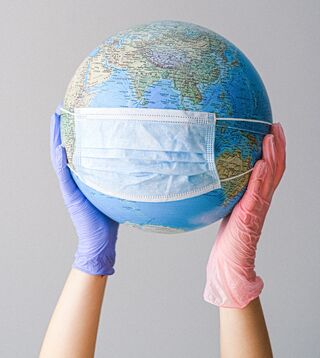Health
Think Also of the Comfort and Rights of Others
Wearing a mask is the ethical thing to do.
Posted August 21, 2020
For seven years of my school career, I walked past a plaque at Winchester-Thurston School in Pittsburgh that included the founders’ credo, “Think Also of the Comfort and Rights of Others.” Never in the history of our country has that saying been more pertinent. Only now, it should be amended to read, “Think Also of the Health and Lives of Others.”
I confess to being a lifelong rule abider (probably slightly too rigidly) and someone who worries about the impact of my behavior on others (perhaps to my own detriment). If you are debating whether to wear a mask in public or if you are oblivious to the need to do so, here is an ethical guide to assist your decision-making.

Last night, in the middle of a pandemic and two days after my university had to pivot to virtual learning because of multiple COVID-19 outbreaks (yes, the magnitude and velocity of the spread of the virus was absolutely predictable), I drove through two viral clouds of male cross country teams. They were not socially distancing, not wearing masks, they were visibly blowing snot onto the sidewalk as runners are known to do, and weaving in and out of other pedestrians at close distance, most of whom sadly, were also unmasked.
On the same day, I was out taking a masked walk and passed (on the other side of the street) an unmasked father with his about 4-year old son. The kid pointed to me and asked, “Dad, why is that lady wearing a mask?” Dad replied, “She doesn’t want to get sick.” The son then asked why his dad didn’t wear a mask, and Dad said, “We’re OK, we don’t have to worry about that.” Well, no Dad, you’re not OK!
Other countries have done a much better job at controlling the virus, largely because citizens adhered to guidelines and mandates—good examples for mask-wearing would be Spain (86%) and Italy 82% (1). But what about the United States? Only 44% of people always wear a mask outside of their home and if you break it down by gender, only 34% of men and 54% of women (2).
Now, I know that the WHO and our administration made a hash out of early recommendations saying masks were not necessary, but the nature of science is that it evolves and public health recommendations need to evolve in parallel. There is no question that this is a very clever virus, and as one of my favorite pink-haired microbiologists, Dr. Siouxsie Wells states, the virus has a “horribly elegant” way of spreading far before people even realize they are sick. All the more reason to be appropriately cautious. It’s not just about you, it’s about thinking of the health and lives of others.
The United States has a history of mask defiance. Back in 1918 when the city of San Francisco mandated mask-wearing in defense against the Spanish flu, thousands of individuals banded together to form the Anti-Mask League of San Francisco. This happened even though mask-wearing clearly contributed to a decline in deaths from the Spanish flu. Here we are again with people again thinking that a mask mandate infringes on civil liberties. It’s time to think also of the comfort and rights of others.
Next time you are debating whether to wear a mask (preferably you won’t even have to debate but it will be automatic, like buckling your seatbelt), ask yourself these simple ethical questions as laid out by Elspeth Tilley (3):
Virtue checks:
- The front page test — would you feel comfortable seeing your behavior on the nightly news?
- The significant other test — would the important people in your life be proud of you?
Deontological check:
- Are there any rules, laws, codes of conduct, or mandates in my community or workplace that I am bound to abide by?
Consequential checks:
- Would you be happy for your action to affect you in the same way it does others (reversibility)?
- Would the outcome be acceptable if everyone behaved this way (universalizability)?
And finally, ask yourself:
- If someone I’m in contact with got sick tomorrow and died, how would I feel about my behavior today?
We are all in this together, but we can only get out of it together by thinking also of the comfort and rights of others.
References
(1) Face-off over face masks. The Economist. July 8, 2020. https://www.economist.com/graphic-detail/2020/07/08/face-off-over-face-masks-europes-latest-north-south-split
(2) Brenan, M. (2020) Americans' Face Mask Usage Varies Greatly by Demographics. Gallup News. https://news.gallup.com/poll/315590/americans-face-mask-usage-varies-greatly-demographics.aspx
(3) Tilley, E. (2020) Coronavirus: Mask or no mask? This simple ethical approach can help with your Covid-19 etiquette. August 21, 2020. https://www.stuff.co.nz/national/health/coronavirus/122530891/coronavirus-mask-or-no-mask-this-simple-ethical-approach-can-help-with-your-covid19-etiquette




